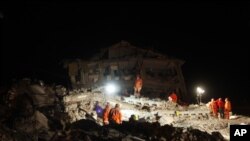After a third night of freezing conditions in southeastern Turkey, hope of finding more survivors from Sunday's powerful earthquake is beginning to fade. But with winter approaching and thousands of people homeless, fear is growing of a greater crisis facing the area.
Two more people have been found alive by rescue workers in their collapsed homes. A teacher and a young student were pulled out of the rubble on Wednesday. The student was found by rescuers using sophisticated micro-cameras that penetrated deep into the collapsed building.
But with powerful aftershocks continuing and sub-freezing temperatures falling on the region for a fourth night, hopes of finding more survivors are fading. The hard decision to turn search-and-rescue into a clearance operation is now looming, and the risk of disease is growing. There are already reports of outbreaks of diarrhea among children.
Video clip: Turkey earthquake rescue
The government has now accepted offers of help from 30 countries around the world, including Israel. Relations between Israel and Turkey have been strained since Israeli commandos raided a Gaza-bound aid flotilla last year, killing nine Turkish activists.
Turkish President Abdullah Gul welcomed the help. He says nearly 50 presidents called with offers of help and that the Foreign Ministry will reach out as soon as it is determined there is a need. President Gul says Turkey did not initially make a call for the international community's help but later reversed its decision.
Criticism has been steadily growing over the government's rejection of most international help. Turkey had initially accepted offers of help only from Iran and Azerbaijan, which border the quake-stricken region. Following the quake, Ankara had at first said it was capable of dealing with the crisis on its own.
Turkish Prime Minister Recep Tayyip Erdogan strongly attacked those who criticized his government's handling of the situation. He says the earthquake in and around the city of Van is a litmus test and that critics of his government are provoking the region's people. He says the critics do not care about the dead, those trapped under the rubble, or the collapsed houses. Mr. Erdogan says they are only trying to profit from the situation.
Analysts say the reason behind Ankara's eventual decision to accept aid is the growing concern that the region could be facing an even bigger crisis.
The 7.2 magnitude quake destroyed thousands of apartment blocks and leveled numerous villages where the houses are made of clay and mud. With winter fast approaching, authorities are under increasing pressure to provide for those who have lost their homes.
While tent cities and field kitchens have been built in several towns and cities, officials have admitted they underestimated the need for tents. Observers say there is now a growing awareness on the part of the government that it is a race against time to accommodate the thousands of homeless before winter sets in.




